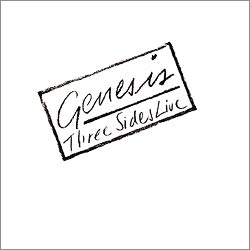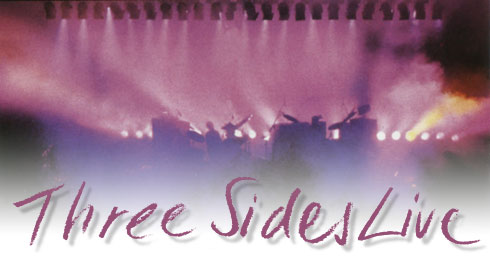- Article
- Read in 7 minutes
Genesis – Three Sides Live – 2CD review
The Abacab tour of 1981 and 1982 was documented as another double live album. Three Sides Live actually does contain only three LP sides of live material
…was a good year for Genesis. The commercial success of their 1981 album Abacab cemented the world-wide fame of the band. At the same time Phil Collins’ solo career took off with the smashing success of In The Air Tonight that made him a household name.
It is therefore hardly surprising that the Abacab tour was substantially more successful than all of Genesis’ previous tours. Things had changed since the days in which people noticed Genesis mainly because of Peter Gabriel’s threatrical mask plays. Now the band got famous for their bombastic stage shows that were supported by powerful light effects.
At the end of the 70s Genesis used mirrors to position the light effects in even more precise and varied ways. 1982, however, became a true revolution of light that would literally overthrow how things were done throughout the whole show business. Together with Showco Genesis supported the development of lights that could change their colour and focus by means of dichromatic lenses in split seconds. It is not surprising that the interior of the Three Sides Livealbum shows a stage photo that illustrates the impressive power of those lights.
 The album came out in June 1982 in two versions. One was the eponymous release geared towards the American market. The fourth side is taken up by five studio songs that were written during the Duke and Abacab sessions. Vertigo also distributed the album in Europe so that this version was released here, too. In the UK it was decided not to have the studio songs and published another four live songs they recorded between 1976 and 1980. The UK version was much sought after in Germany, and a “Four Sides Live” label on the album cover indicated that the records were worth their steep price.
The album came out in June 1982 in two versions. One was the eponymous release geared towards the American market. The fourth side is taken up by five studio songs that were written during the Duke and Abacab sessions. Vertigo also distributed the album in Europe so that this version was released here, too. In the UK it was decided not to have the studio songs and published another four live songs they recorded between 1976 and 1980. The UK version was much sought after in Germany, and a “Four Sides Live” label on the album cover indicated that the records were worth their steep price.
The songs do not follow the order of the setlist. This is a kind of tribute to the space constraints of an LP release. Back then people tried to make sure that the songs were distributed evenly across the four LP sides – just like on Seconds Out.
Three Sides Live differs distinctly from Seconds Out because of its harder sound. The drums have more oomph, the guitars are rougher and Collins’ vocals has an aggressive edge it has never had before. A certain lack of transparency is the price one has to pay for it. The album sounds more compressed and less detailed than Seconds Out.
The Songs
The album begins with Turn It On Again played slightly faster than the original, an exciting and effective opener. After the quiet guitar intro Collins counts them in and off they go. And it is fun to listen to because of the joy they have in playing the music so consummately. When the applause fades a giant rears its head, the intro to Genesis’ only prog classic from Abacab, Dodo. The song is even richer than the original. Mike’s bass pedals thunder while Daryl makes his guitar scream; together they show off the strengths of the band. Unfortunately these are the moments when one notices the compressed sound of the album. They lack brilliance and transparency. In fact, the recordings from five years before that were used for Seconds Out are superior.
Their 1981 hit Abacab comes across very strong and close to the original. Phil’s aggressive vocals lend their power to the song. The extensive instrumental section in particular profits from the live performance; this song comes into full bloom live compared to the studio version, and it ends very in a very determined way.
The second side of the LP begins with the actual opening piece of the concert, Behind The Lines. It is a masterpiece and a big highlight on Three Sides Live. Luckily the band decided to link this song with Duchess so that both songs excel in a very dignified and self-confident presentation.
Tony Banks claims in Chapter & Verse that Me And Sarah Jane is his last classical composition in the old Genesis style. The band did well to play this sophisticated complex of chords and harmonies live. Though critics frequently complain about the detailed performances that refrain from any interpretation it is precisely this performance that makes the song so strong: The band can really dedicate themselves to the drama and passion of the number.
The second side ends with Follow You Follow Me. In the reviewer’s opinion this song was performed much better in 2007. On Three Sides Live it lacks the necessary calm, and Collins in particular is too impulsive.
Misunderstanding is an easy entrance into the most demanding side of the original album. The emotional vocals at its end are quite fitting and add a touch of soul music to Misunderstanding.
The In The Cage medley is a real treat for prog lovers. No lifeless routine here, but passionate joy of playing. It is ever so exciting so hear the virtuosity with which the band play this strict composition. They light fireworks of arpeggios and melodies accompanied by a rhythm group that makes the audience groove even to these odd signatures. In The Cage does not fall apart, but keeps up the tension throughout. At its end the band move on into the equally gripping Cinema Show. As the number of musicians involved temporarily drops to three the Genesis core find enough space to perform this sumptuous music. The same goes for the third part of this mini suite, The Colony Of Slippermen. After this feast the music moves on into the quiet of Afterglow before it again ascends to a glorious finale. At this point the album proper ends because the fourth side offers something completely different, be it the “studio version” or the live songs from the UK edition.
The “fourth side”
The studio tracks have a very dry, direct sound. The first three songs were written during the Abacab sessions while the other two were originally planned for Duke. This surplus of really good material proves just how great their output was in those years. The concept of placing a chart success on the fourth album side proved successful; though Paperlate became a hit only in the UK it was nevertheless played frequently on the radio. That may have been because of Phil’s solo success since the brass section makes the song sound like a typical Collins product. It is, however, a joint composition.
You Might Recall is still quite relaxed, but Me And Virgil develops the impressive drama that distinguished Genesis’ pop music from all others. Evidence Of Autumn is a typical Banks composition that would have fit well on his first solo album A Curious Feeling and its melancholy mood.
Three Sides Live ends with a thoughtful sad song by Mike Rutherford, Open Door. It is an unusual ending for a lively, stirring live record.
The UK version seems a bit more harmonic, though the recordings do not really fit the first three sides, either. Prog listeners have field day, of course. It is, however, beyond the reviewer’s comprehension why the ID markers (track divisions) were not fixed.
One For The Vine takes us back to the epic songs of the 70s. When played live this song seems less weird than on Wind & Wuthering, but far more coherent. Again the supremely good performance and the passion of all the musicians are remarkable. They always perform with a view to the song, as one notices particularly with Daryl’s unobtrusive guitar playing. With an epos like this you do not want any meandering jams but pay close attention to the story.
The Fountain Of Salmacis rises very lively, a highlight of the fourth side live. Collins’ interpretation of Gabriel’s original works very well, and the band have a ball playing this song. You would be hard-pressed to find a better live version of this song!
The collection of old live recordings ends with another medley. It would have fit better on Seconds Out, though, because it was recorded back in 1976.
It is played very ambitiously, but it cannot get close to the drive the studio version has. Ending the album with a symphonic piece like Watcher Of The Skies is a good choice. It is, of course, regrettable that it is not the full version, but this finale is a big bang that brings the live set to a wonderful ending.
All in all…
Three Sides Live is worth getting, though using the original setlist might have been even more exciting. Prog lovers may want to buy the UK edition. If you prefer Genesis during their period of change and you like Abacab you are better off with the eponymous version. The only thing to consider is the circumstance that there is no version so far that combines the acoustic improvements of the remaster version with the five studio recordings.
Track list:
CD1
Turn It On Again
Dodo
Abacab
Behind The Lines
Duchess
Me And Sarah Jane
Follow You Follow Me
CD2
Misunderstanding
In The Cage / The Cinema Show / The Colony Of Slippermen
Afterglow
Paperlate +
You Might Recall +
Me And Virgil +
Evidence Of Autumn +
Open Door +
One For The Vine *
Fountain Of Salmacis *
Watcher Of The Skies / It *
* Live tracks on the UK Four Sides Live as well as the Definitive Edition Remaster
by Robert Krauskopf
translated by Martin Klinkhardt

